小学五年级英语知识点多篇
新人教版PEP五年级英语上册各单元知识点复习总结
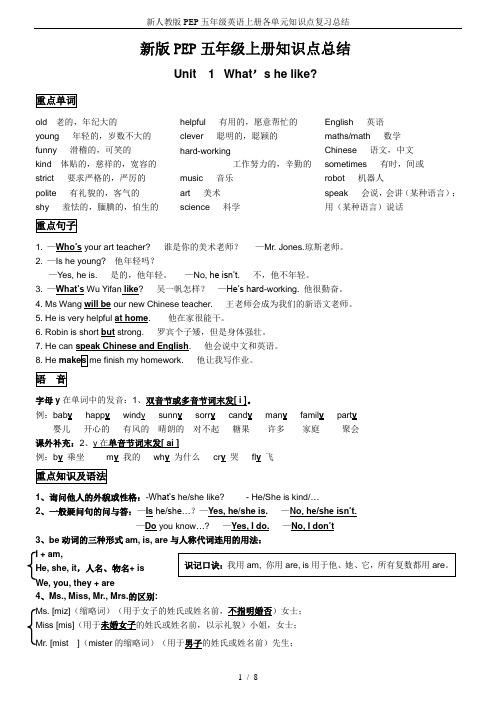
新人教版PEP五年级英语上册各单元知识点复习总结新版PEP五年级上册知识点总结Unit 1 What’s he like?重点单词old 老的,年纪大的young 年轻的,岁数不大的funny 滑稽的,可笑的kind 体贴的,慈祥的,宽容的strict 要求严格的,严厉的polite 有礼貌的,客气的shy 羞怯的,腼腆的,怕生的helpful 有用的,愿意帮忙的clever 聪明的,聪颖的hard-working工作努力的,辛勤的music 音乐art 美术science 科学English 英语maths/math 数学Chinese 语文,中文sometimes 有时,间或robot 机器人speak 会说,会讲(某种语言);用(某种语言)说话重点句子1. —Who’s your art teacher? 谁是你的美术老师?—Mr. Jones.琼斯老师。
2. —Is he young? 他年轻吗?—Yes, he is. 是的,他年轻。
—No, he isn’t.不,他不年轻。
3. —What’s Wu Yifan like? 吴一帆怎样?—He’s hard-working. 他很勤奋。
4. Ms Wang will be our new Chinese teacher. 王老师会成为我们的新语文老师。
5. He is very helpful at home. 他在家很能干。
6. Robin is short but strong. 罗宾个子矮,但是身体强壮。
7. He can speak Chinese and English. 他会说中文和英语。
8. He makes me finish my homework. 他让我写作业。
语音字母y在单词中的发音:1、双音节或多音节词末发[ i ]。
例:bab y happ y windy sunn y sorr y cand y man y famil y part y婴儿开心的有风的晴朗的对不起糖果许多家庭聚会课外补充:2、y在单音节词末发[ ai ]例:b y 乘坐m y 我的wh y 为什么cr y 哭fl y 飞重点知识及语法1、询问他人的外貌或性格:-What’s he/she like? - He/She is kind/…2、一般疑问句的问与答:—Is he/she…?—Yes, he/she is.—No, he/she isn’t.—Do you know…? —Yes, I do.—No, I don’t3、be动词的三种形式am, is, are与人称代词连用的用法:I + am,He, she, it,人名、物名+ isWe, you, they + are4、Ms., Miss, Mr., Mrs.的区别:Ms. [miz](缩略词)(用于女子的姓氏或姓名前,不指明婚否)女士;Miss [mis](用于未婚女子的姓氏或姓名前,以示礼貌)小姐,女士;Mr. [mist](mister的缩略词)(用于男子的姓氏或姓名前)先生;识记口诀:我用am, 你用are, is用于他、她、它,所有复数都用are。
五年级英语知识点整理

五年级英语知识点整理多一份投入,多一种学习,多一些反思,多一点执着。
对于英语,我们需要把陌生的单词片语和句型语法不断的熟悉和熟练,重复重复再重复,熟练熟练再熟练,是学会英语的不二法门。
下面是小编给大家整理的一些五年级英语的知识点,希望对大家有所帮助。
小学五年级英语上册知识点1、I have eggplant and tomatoes for lunch. 我午饭吃茄子和西红柿。
这里的eggplant是指一道菜,是被切碎了的,熟的,所以这里的eggplant是不可数名词,不能用复数形式。
西红柿 tomato 和土豆 potato 复数形式在后面加es tomatoes, potatoesfish 当表示为活的鱼的时候,是可数的,但它是单复数同形;当表示为鱼肉的时候,是不可数的。
cabbage 当表示是一种包菜的数量时,是不可数名词,表示为cabbage;当表示不同种类的包菜时,是可数名词,表示为cabbages eggplant 当表示是未经过烹饪的蔬菜时,是可数名词,表示为eggplants;当表示经烹饪过的菜肴时,是不可数名词,表示为eggplant常见的肉类为不可数名词,pork mutton beef等2. 下列单词的形容词形式:health---healthy(健康的) taste---tasty(好吃的)3.What’ s your favorite food? 后面一般都跟集合的名词:food 食物 fruit水果 drink饮料 colour颜色 class 课程 book 书 sport 运动 vegetable 蔬菜 number数字 day天五年级英语上册复习知识点重点句型1.What are you doing?你正在做什么?2.I am talking to you.我正在和你说话呢。
e on, John.老实点,约翰。
4.I’m reading a book.我正在看书。
小学五年级英语重点必备句型【五篇】
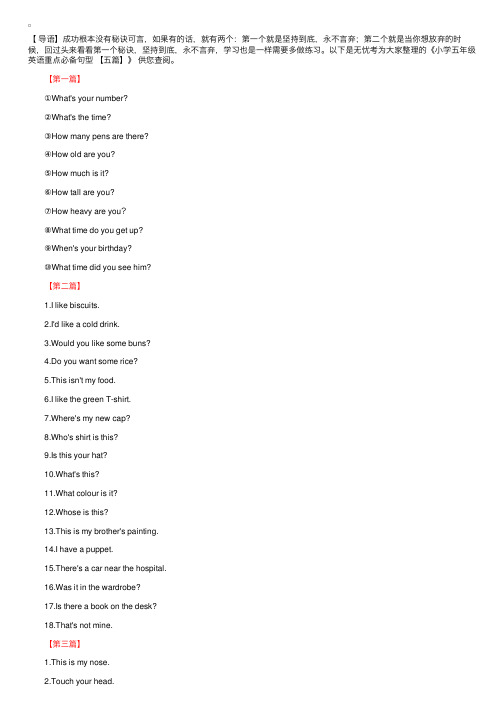
【导语】成功根本没有秘诀可⾔,如果有的话,就有两个:第⼀个就是坚持到底,永不⾔弃;第⼆个就是当你想放弃的时候,回过头来看看第⼀个秘诀,坚持到底,永不⾔弃,学习也是⼀样需要多做练习。
以下是⽆忧考为⼤家整理的《⼩学五年级英语重点必备句型【五篇】》供您查阅。
【第⼀篇】①What's your number? ②What's the time? ③How many pens are there? ④How old are you? ⑤How much is it? ⑥How tall are you? ⑦How heavy are you? ⑧What time do you get up? ⑨When's your birthday? ⑩What time did you see him?【第⼆篇】1.I like biscuits. 2.I'd like a cold drink. 3.Would you like some buns? 4.Do you want some rice? 5.This isn't my food. 6.I like the green T-shirt. 7.Where's my new cap? 8.Who's shirt is this? 9.Is this your hat? 10.What's this? 11.What colour is it? 12.Whose is this? 13.This is my brother's painting. 14.I have a puppet. 15.There's a car near the hospital. 16.Was it in the wardrobe? 17.Is there a book on the desk? 18.That's not mine.【第三篇】1.This is my nose. 2.Touch your head. 3.Raise your arm. 4.I'm twelve years old. 5.My hobby is reading. 6.I like music. 7.I'm interested in space. 8.My name is Peter. 9.I'm tall and thin. 10.Do you have any hobbies? 11.Who's he? He's my father. 12.He's a doctor 13.He likes playing games. 14.My father helps me. 15.Is he a soldier? 16.What's he?【第四篇】1.My singing is louder than yours. 2.I'm taller than you. 3.There more shops in Picture One. 4.Some stories are more interesting than others. 5.The most interesting stories. 6.Who is fatter? 7.Where were you? 8.Who was first? 9.Was it in the wardrobe? 10.Benny took my ball. 11.Where did you go? 12.What did you do? 13.I came by plane. 14.Anne wanted to skate.【第五篇】1.I'm/You're /He's/She's /We're/They're (not) going to swim. 2.Are you going to swim? 3.Is he/she going to visit Anne? 4.What are you going to do? 5.What is he going to do? 6.When are they going to swim? 7.Tomorrow will be rainy. 8.I'll stay at home. 9.I come to school by bus. 10.Your homework is good. 11.What time do you get up? 12.She always get up early.。
小学五年级英语知识点归纳总结
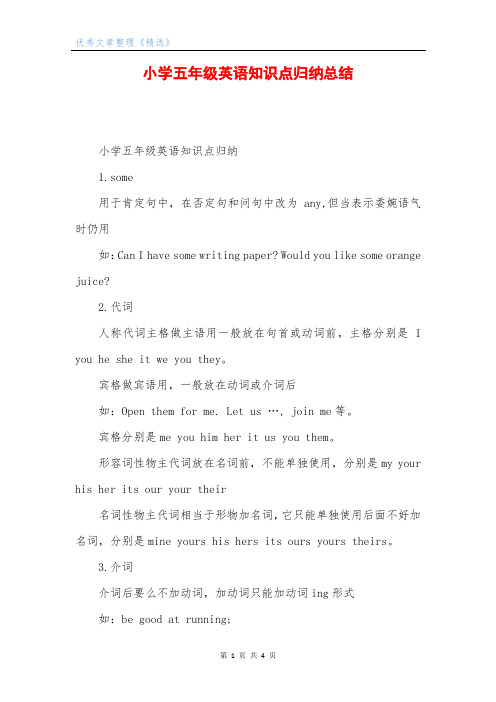
小学五年级英语知识点归纳总结小学五年级英语知识点归纳1.some用于肯定句中,在否定句和问句中改为any,但当表示委婉语气时仍用如:Can I have some writing paper? Would you like some orange juice?2.代词人称代词主格做主语用一般放在句首或动词前,主格分别是 I you he she it we you they。
宾格做宾语用,一般放在动词或介词后如:Open them for me. Let us …, join me等。
宾格分别是me you him her it us you them。
形容词性物主代词放在名词前,不能单独使用,分别是my your his her its our your their名词性物主代词相当于形物加名词,它只能单独使用后面不好加名词,分别是mine yours his hers its ours yours theirs。
3.介词介词后要么不加动词,加动词只能加动词ing形式如:be good at running;第1页共4页do well in jumping;4.时间介词季节前,月份前用介词in如:in summer;in March具体的哪一天如星期几,几月几日用介词on如:on Saturday; on the second of April; on Wednesday morning在几点钟前用介词at如:at a quarter to four;只在上下午晚上用in如:in the morning/ afternoon/ evening;但在夜间用at night。
另:季节,月份和星期前不好加the.5.名词复数构成的(方法)有规则的有:(1)直接在名词后加s如orange—oranges; photo—photos;(2) 以x, s, sh, ch 结尾的加es如:box—boxes; glass—glasses; waitress—waitresses; watch—watches;peach--peaches(3) 以辅音字母加y结尾的改y为i加es如:study—studies;library—libraries; hobby—hobbies;family—families;(4)以f, fe结尾的改f, fe 为v+es如:knife—knives; thief —thieves(注:以o结尾的我们学过的只有mango加es, mango—mangoes其余加s,)不规则的有:man—men; woman—women; people—people; child—children 6.动词第三人称单数的构成(1)直接在动词后加s如:run—runs; dance—dances(2)以s,sh,ch,o结尾的加es如:do—does;go—goes;wash—washes;catch—catches(3)以辅音字母加y结尾的改y为i加es如:study—studies; carry—carries;小学五年级英语知识点(总结)人称代词、名词所有格及序数词1、主格用来作句中的主语,用于动词前面。
人教版五年级英语知识点总结

人教版五年级英语知识点总结GRADE 5Unit 1 What’s he like?old young funny kind strict polite hard-working helpful clever shy high know our Ms will sometimes robot him speak finishIs he young? 他年轻吗?No, he isn’t. 不,他不年轻Ms Wang will be our new Chinese teacher. 王老师将是我们的新中文老师Our new PE teacher will come today. 我们新的体育老师今天会来What’s he like? 他什么样?He’s kind and hard-working. 他很和蔼、勤奋Unit 2 My weekMonday Tuesday Wednesday Thursday Friday Saturday Sunday weekend wash wash my clothes watch watch TV do homework read books play football cooking often park tired sport play sports should every day scheduleWhat do you have on Friday? 你星期五有什么课?I have maths, English and music. 我有数学、英语和音乐课Do you often read books in this park? 你经常在这个公园里看书吗?No, I don’t. 不,我不经常在这里看书Do you often play football on the weekend? 你经常在周末踢足球吗?No, but I often sleep. 不,但我经常睡觉What do you do on Thursdays, grandpa? 爷爷,星期四你做什么?I have a cooking class with your grandma. 我和你奶奶有一节烹饪课You should play sports every day. Here is a new schedule for you. 你应该每天做体育运动,这有个新时间表给你I need some pencils. 我需要一些铅笔We don’t have enough money. 我没有足够的钱Unit 3 What would you like?sandwich salad hamburger ice cream tea fresh healthy delicious hot sweet drink thirsty favourite food Dear onionWhat would you like to eat? 你想吃什么?A sandwich, please. 请给我一个三明治What would you like to drink? 你想喝什么?I’d like some water. 我想喝点水What’s your favourite food? 你最喜欢吃什么食物?Noodles, they’re healthy and delicious. 面条,面条又健康又好吃Sarah’s favourite food is salad, her favourite drink is milk.莎拉最喜欢的食物是色拉,她最喜欢的饮料是牛奶Be careful! 小心!I will. 我会的Unit 4 What can you do?sing song sing English songs play the pipa kung fu do kung fu dance draw cartoon draw cartoons cook swim play basketball ping-pang play ping-pang speak English we’ll=we will party next wonderful learn any problem no problem want send emailWe’ll have an English party next Tuesday. 下星期二我们将开个英语晚会What can you do for the party, children? 孩子们,你们能为联欢会做什么?I can sing English songs. 我能唱英文歌I can play the pipa. 我能弹琵琶I can do some kung fu. 我可以表演一些功夫do kung fu 练武术I can draw pictures./ draw cartoons. 我能画画/ 画漫画Can you do any kung fu, John? 约翰,你会武术吗?Yes, I can. 是的,我会武术No, I can’t. 不,我不会Unit 5 There is a big bedclock plant bottle water bottle bike photo front in front of between above beside there flower dirty move everywhere mouse live nature There is a big table beside the bed . 床旁边有张大桌子There are so many pictures here. 这里有这么多幅画My father can draw very well. 我爸爸能画得很好What a nice photo! 一张多么漂亮的照片啊Unit 6 In a nature parkforest river lake mountain hill tree bridge building village house boating go boating aren’t= are not rabbitIs there a river in the forest, Miss White? 怀特小姐,森林里有河吗?No, there isn’t. 不,森林里没有河Are there any tall buildings in the natural park? 自然公园里高楼吗?No, they aren’t. 不,自然公园里没有高楼Is there a river in front of the mountain? 在山的前面有条河吗?Yes, there is. / No, there isn’t.是的,有/不,没有Unit 1 My dayeat breakfast eating lunch have…class…play sports exercise do morning exercises eat dinner clean my room go for a walk go shopping take dancing take a dancing class after start usually Spain Spanish latea.mp.m when why shop work last sound also busy need play letter live island always cave go swimming winWhen do you finish class in the morning? 你们上午的课到几点结束?We finish class at 1 o’clock. 我们一点钟下课What do you do on the weekend? 你周末做什么?I often watch TV and play ping-pong with my father. 我经常看电视,也常和我爸爸一起打乒乓球Unit 2 Myfavourite seasonspring summer autumn fall winter season picnic go on a picnic pick pick apples snowman make a snowman which best snow good job because vacation all pink lovely leaf(leaves) paintWhich season do you like best? 你最喜欢哪个季节?Winter. 冬天Why? 为什么?Because I like summer vacation. 因为我喜欢暑假Unit 3 My school calendarJanuary February March April May June July August September October November December a few thing meet sports meet Easter trip year plant contest the Great Wall national National Day American Thanksgiving Christmas holiday game roll look for chocolate bunny RSVP(尤用于请柬)请赐复byWhen is the party? 聚会什么时候举行?It’s in April. 在4月When is the trip this year? 今年的(秋)游在什么时候?It’s in October. We will go to the Great Wall. 在10月,我们将去长城Unit 4 When is Easter?first(1st) second(2nd) third(3rd) fourth(4th) fifth(5th) twelfth(12th) twentieth(20th) twenty-first twenty-third(23rd) thirtieth(30th) special fool kitten diary still noise fur open walkWhen is April Fool’s Day? 愚人节是哪天?It’s on April 1st. 它在4月1日When is your birthday? 你的生日是哪天?My birthday is on April 4th 我的生日是4月4日Unit 5 Whose dog is it?mine yours his hers its theirs ours climbing eating playing jumping drinking sleeping each other each other excited likeThe yellow picture is mine. 那幅黄色的画是我的Are these all ours? 这些都是我们的画吗?Whose is it? 这是谁的?It’s Zhang Peng’s. 是张鹏的Is he drinking water? 它在喝水吗?No, he isn’t. He’s eating. 不是,它在吃东西Unit 6 Work quietly!doing morning exercise reading a book listening to music keep keep to the right show sure talk quietly turn take turns bamboo anything else exhibition say have a looksushi teach Canadian Italian Germany Scotland keep your desk clean What are they doing? 它们在干什么?They’re eating lunch. 它们正在吃午饭What’s the little monkey doing? 那只小猴子在干什么?It’s playing with its mother! 它正在和它妈妈玩耍Shh. Talk quietly. 嘘,小声讲话Keep your desk clean. 保持桌面整洁。
小学五年级英语知识点六篇
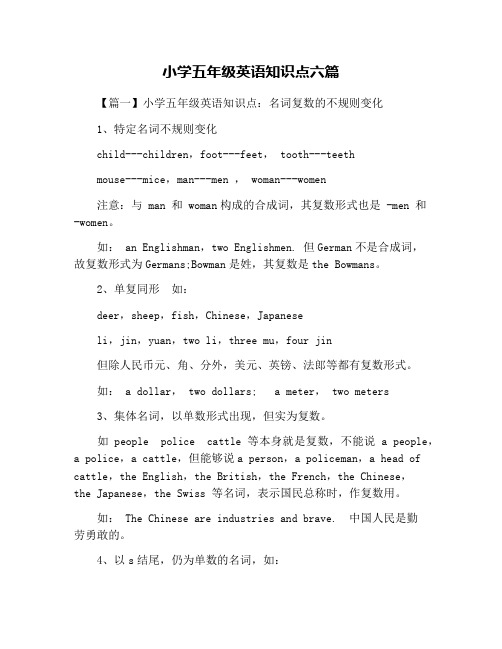
小学五年级英语知识点六篇【篇一】小学五年级英语知识点:名词复数的不规则变化1、特定名词不规则变化child---children,foot---feet, tooth---teethmouse---mice,man---men , woman---women注意:与 man 和 woman构成的合成词,其复数形式也是 -men 和-women。
如: an Englishman,two Englishmen. 但German不是合成词,故复数形式为Germans;Bowman是姓,其复数是the Bowmans。
2、单复同形如:deer,sheep,fish,Chinese,Japaneseli,jin,yuan,two li,three mu,four jin但除人民币元、角、分外,美元、英镑、法郎等都有复数形式。
如: a dollar, two dollars; a meter, two meters3、集体名词,以单数形式出现,但实为复数。
如people police cattle 等本身就是复数,不能说 a people,a police,a cattle,但能够说a person,a policeman,a head of cattle,the English,the British,the French,the Chinese,the Japanese,the Swiss 等名词,表示国民总称时,作复数用。
如: The Chinese are industries and brave. 中国人民是勤劳勇敢的。
4、以s结尾,仍为单数的名词,如:a. maths,politics,physics等学科名词,为不可数名词,是单数。
b. news 是不可数名词。
c. the United States,the United Nations 应视为单数。
如:The United Nations was organized in 1945. 联合国是1945年组建起来的。
小学五年级英语知识点归纳
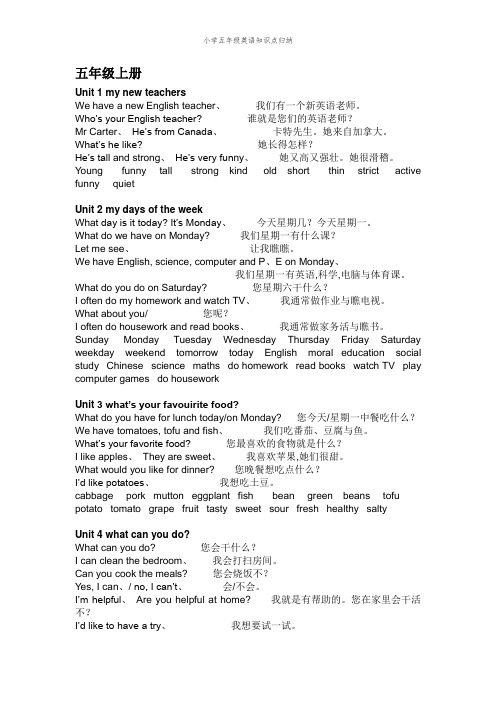
五年级上册Unit 1 my new teachersWe have a new English teacher、我们有一个新英语老师。
Who’s your English teacher?谁就是您们的英语老师?Mr Carter、He’s from Canada、卡特先生。
她来自加拿大。
What’s he like?她长得怎样?He’s ta ll and strong、He’s very fun ny、她又高又强壮。
她很滑稽。
Young funny tall strong kind old short thin strict active funny quietUnit 2 my days of the weekWha t day is it today? It’s Monday、今天星期几?今天星期一。
What do we have on Monday? 我们星期一有什么课?Let me see、让我瞧瞧。
We have English, science, computer and P、E on Monday、我们星期一有英语,科学,电脑与体育课。
What do you do on Saturday? 您星期六干什么?I often do my homework and watch TV、我通常做作业与瞧电视。
What about you/ 您呢?I often do housework and read books、我通常做家务活与瞧书。
Sunday Monday Tuesday Wednesday Thursday Friday Saturday weekday weekend tomorrow today English moral education social study Chinese science maths do homework read books watch TV play computer games do houseworkUnit 3 what’s your favouirite food?What do you have for lunch today/on Monday? 您今天/星期一中餐吃什么?We have tomatoes, tofu and fish、我们吃番茄、豆腐与鱼。
新人教版五年级英语上册知识点
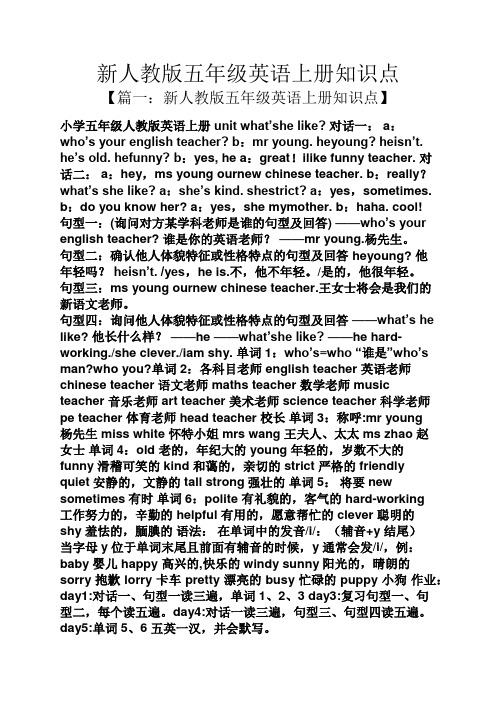
新人教版五年级英语上册知识点【篇一:新人教版五年级英语上册知识点】小学五年级人教版英语上册unit what’she like? 对话一: a:who’s your english teacher? b:mr young. heyoung? heisn’t. he’s old. hefunny? b:yes, he a:great!ilike funny teacher. 对话二: a:hey,ms young ournew chinese teacher. b:really?what’s she like? a:she’s kind. shestrict? a:yes,sometimes. b:do you know her? a:yes,she mymother. b:haha. cool!句型一:(询问对方某学科老师是谁的句型及回答) ——who’s your english teacher? 谁是你的英语老师?——mr young.杨先生。
句型二:确认他人体貌特征或性格特点的句型及回答 heyoung? 他年轻吗?heisn’t. /yes,he is.不,他不年轻。
/是的,他很年轻。
句型三:ms young ournew chinese teacher.王女士将会是我们的新语文老师。
句型四:询问他人体貌特征或性格特点的句型及回答——what’s he like? 他长什么样?——he ——what’she like? ——he hard-working./she clever./iam shy. 单词1:who’s=who “谁是”who’s man?who you?单词2:各科目老师 english teacher 英语老师chinese teacher 语文老师 maths teacher 数学老师 musicteacher 音乐老师 art teacher 美术老师 science teacher 科学老师pe teacher 体育老师 head teacher 校长单词3:称呼:mr young杨先生 miss white 怀特小姐 mrs wang 王夫人、太太 ms zhao 赵女士单词4:old 老的,年纪大的 young 年轻的,岁数不大的funny 滑稽可笑的 kind 和蔼的,亲切的 strict 严格的 friendlyquiet安静的,文静的 tall strong强壮的单词5:将要new sometimes有时单词6:polite 有礼貌的,客气的 hard-working工作努力的,辛勤的 helpful 有用的,愿意帮忙的 clever 聪明的shy 羞怯的,腼腆的语法:在单词中的发音/i/:(辅音+y 结尾)当字母y 位于单词末尾且前面有辅音的时候,y 通常会发/i/,例:baby 婴儿 happy 高兴的,快乐的 windy sunny阳光的,晴朗的sorry 抱歉 lorry 卡车 pretty 漂亮的 busy 忙碌的 puppy 小狗作业:day1:对话一、句型一读三遍,单词1、2、3 day3:复习句型一、句型二,每个读五遍。
- 1、下载文档前请自行甄别文档内容的完整性,平台不提供额外的编辑、内容补充、找答案等附加服务。
- 2、"仅部分预览"的文档,不可在线预览部分如存在完整性等问题,可反馈申请退款(可完整预览的文档不适用该条件!)。
- 3、如文档侵犯您的权益,请联系客服反馈,我们会尽快为您处理(人工客服工作时间:9:00-18:30)。
小学五年级英语知识点多篇学英语不是难不难的问题,是你肯不肯下功夫的问题!说实话,学好英语,必然是件苦差事!但,只要你有动力!你就会坚持下去,一旦你坚持了一段时间,你就会有了成就感,那你自然就会有了兴趣!以下是整理的《小学五年级英语知识点六篇》,希望对您有所帮助。
小学五年级英语知识点:名词复数的不规则变化1、特定名词不规则变化child---children,foot---feet,tooth---teethmouse---mice,man---men ,woman---women注意:与man 和woman构成的合成词,其复数形式也是-men 和-women。
如:an Englishman,two Englishmen. 但German不是合成词,故复数形式为Germans;Bowman是姓,其复数是the Bowmans。
2、单复同形如:deer,sheep,fish,Chinese,Japaneseli,jin,yuan,two li,three mu,four jin但除人民币元、角、分外,美元、英镑、法郎等都有复数形式。
如:a dollar,two dollars; a meter,two meters3、集体名词,以单数形式出现,但实为复数。
如people police cattle 等本身就是复数,不能说a people,a police,a cattle,但可以说a person,a policeman,a head of cattle,the English,the British,the French,the Chinese,the Japanese,the Swiss 等名词,表示国民总称时,作复数用。
如:The Chinese are industries and brave.中国人民是勤劳勇敢的。
4、以s结尾,仍为单数的名词,如:a. maths,politics,physics等学科名词,为不可数名词,是单数。
b. news 是不可数名词。
c. the United States,the United Nations 应视为单数。
如:The United Nations was organized in 1945. 联合国是1945年组建起来的。
d. 以复数形式出现的书名,剧名,报纸,杂志名,也可视为单数。
如:“The Arabian Nights” is a very interesting story-book.《一千零一夜》是一本非常有趣的故事书。
5、表示由两部分构成的东西,如:glasses (眼镜)trousers,clothes若表达具体数目,要借助数量词pair(对,双);suit(套); a pair of glasses; two pairs of trousers6、另外还有一些名词,其复数形式有时可表示特别意思,如:goods货物,waters水域,fishes(各种)鱼小学五年级英语知识点:基数词能否加“s”1.thousands of / millions of / hundreds and hundreds of / hundreds of thousands of / thousands upon thousands of 成千上万例:There are hundreds of thousands of people in the park. 公园里的人有千百个。
2. in twos and threes 三三两两例:They came home from church by twos and threes. 他们三三两两地从教堂回来。
3. at sixes and sevens 乱七八糟例:His wife was away and the house was at sixes and sevens. 他妻子不在,家里乱七八糟的。
4. in ones fifties 在五十多岁时(fifties 前可插入early,late,mid-,middle)例:The boys are all in their teens. 那些男孩年纪都在十几岁。
Jane is only in her early forties. 简才刚刚四十出头。
She was in her mid-twenties. 她有二十五、六岁。
He was then in his late seventies. 他当时已经快八十岁了。
5. in the 1960s (in the 1960s) 二十世纪六十年代例:He made acquaintance of her in the 1960s. 六十年代他认识了她。
小学五年级英语知识点:特殊的数字表达1. once 一次single 单一的singleness 单一;单身single-handed 独手的,只用一只手的2. pair 双,对double 两倍的double-decker 双层床;双层电车double-chinned 双下巴的3. quarter 四分之一;一刻钟;两角五分钱(美国、加拿大的)three quarters 四分之三4. dozen 十二,一打two dozen of 两打dozens of 好几打,很多的in dozens 成打的dozenth = twelfth 第十二a bakers (/ printers / long) dozen 十三个5. score 二十three score and ten 七十two score of 四十个scores of 大批的in scores 大量地,大批地6. fortnight 十四日,两星期fortnightly 两星期一次的;双周刊7. decade 十年century 百年,世纪bicentenary 二百周年(的)octocentenary 八百周年(的)millenary / millennium 千年,千年小学五年级英语知识点:分数的表示法1. 用基数词+序数词表示:分数在英语中通常是借助于基数词和序数词来共同表达的。
其中基数词表示分子,序数词表示分母。
如:The centimeter is one-tenth of the decimeter or one-hundredth of the meter. 厘米是分米的十分之一,或者说是米的百分之一。
However,the number of the boys will be less than a third of the girls in the class. 但是班里男生的人数将比女生的三分之一更少。
*从以上例子可以看出:分子为1时,既可以用one,也可用a。
2. 如果分子大于1,分母则要用复数形式。
如:三分之一one-third;三分之二two-thirds3. 二分之一不能说a(one) second,而要说a(one) half。
四分之一和四分之三可以说a(one) fourth 和three-fourths,但常用a quarter 和three quarters 表示。
4. 分数修饰的名词在句子中作主语时,谓语动词是用单数还是复数取决于名词,即与名词保持一致。
如:Only one-fifth of air consists of oxygen. 氧气只占空气的五分之一。
About two thirds of the students are going to attend the meeting. 大约三分之二的学生都将参加会议。
5. 带分数的表示:所谓带分数,实际上是整数+分数,表达时分而述之,只是整数部分与分数部分要用连词and 连接。
如:You should finish the work within one and a fourth hours. 你应在1小时25分钟内完成工作。
6. 分数常和of 连用,作主语或宾语,但分数也可以不带of 短语直接作主语或宾语。
例如:In U.S.,two-thirds continue to support death penalty. 在美国,三分之二的人仍然支持死刑。
小学五年级英语知识点:形容词原级的用法1. 形容词原级可以被very,quite,so,rather 等词的修饰1)very 非常This is a very interesting book. 这是一本很有趣的书。
注:very 也可以接形容词级,表示强调。
格式是:the very + est 结尾的形容词级或是不规则形容词级。
例:the very lowest price 最低的价格2)quite 相当Its quite cold this morning. 今天早晨相当冷。
3)so 那么You are so fast. 你那么快。
4)rather 有些,颇I think youre rather unkind not to stay. 我想你不留下来有点太不友善了。
2. 在asas 和not soas 的中间形容词常用原级1)asas 表示相等This knife is as sharp as that one. 这把刀和那把一样锋利。
He is as tall as I. 他的个子和我一般高。
2)not soas,not asas 表示不如Hes not so clever as his brother. 他不像他的兄弟那么聪明。
小学五年级英语知识点:人称代词之主、宾格的替换1) 宾格代替主格a.在简短对话中,当人称代词单独使用或在not 后,多用宾语。
I like English.--我喜欢英语。
Me too.--我也喜欢。
Have more wine?--再来点酒喝吗?Not me.--我可不要了。
b.在表示比较的非正式的文体中,常用宾格代替主格。
但如果比较状语的谓语保留,则主语只能用主格。
He is taller than I/me.He is taller than I am.2) 主格代替宾格a. 在介词but,except 后,有时可用主格代替宾格。
b. 在电话用语中常用主格。
I wish to speak to Mary.--我想和玛丽通话。
This is she.--我就是玛丽。
注意:在动词be 或to be 后的人称代词视其前面的名词或代词而定。
I thought it was she.--我以为是她。
(主格----主格)I thought it to be her.(宾格----宾格)I was taken to be she.--我被当成了她。
(主格----主格)They took me to be her.--他们把我当成了她。
